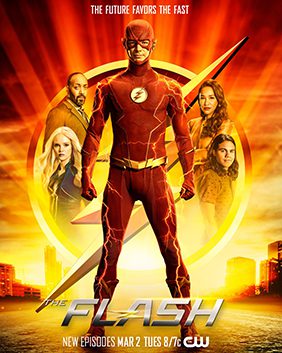The Flash: Season 7
The CW
Creators: Greg Berlanti, Geoff Johns, and Andrew Kreisberg
From the start, The Flash season 7 had the difficult task to finish the season 6 storyline that was interrupted by the COVID-19 pandemic. In the meantime, the writers also needed to write out three beloved characters. As expected, all those things led to a very messy season with good ideas that were not executed well.
Reflection and Lies (episode 1 – 3)
The season opens with the conclusion of the ‘Reflection and Lies’ graphic novel, which began halfway through season 6. It focuses on Team Flash fighting Eva McCulloch and trying to save Iris, who is trapped in the Mirror Dimension. The storyline was left unfinished at the end of the previous season because of the COVID-19 pandemic.
The Flash was by far the Arrowverse show that suffered the most due to the pandemic. The season 6 finale is anticlimatic and unsatisfying and doesn’t bring any sense of closure to the storyline. It doesn’t work, really. So when we pick up on that story in season 7, things are still very much anticlimatic. Eva McCulloch works as a villain and, back when season 6 was airing, the storyline was interesting enough, but the long hiatus really hurt its pacing.
The death of Harrison Wells at the end of episode 1 works well as an exit for the character. However, bringing yet another version of the character in at the end of episode 2 only for him to be written off again at the end of episode 3 felt unearned. It almost feels like Nash’s death meant nothing because there is still a version of the character around. Ralph Dibny’s exit also doesn’t work. Since his actor was fired between seasons 6 and 7, the character’s arc doesn’t get a proper end.
God Complex (Episodes 4 – 11)
After the end of ‘Reflection & Lies’, we move on to ‘God Complex’, a storyline that brings the always great Michelle Harrison to the spotlight. Harrison shines as the Speed Force and is one of the only good things about this arc. However, not even Harrison’s acting can make the awful writing work. The arc as a whole is a good idea and has a lot of potential, but in the end, it doesn’t work. The new characters are underdeveloped and the writing, especially in the last three episodes, is bad.
Caitlin/Frost’s arc is also very messy. It’s clear the writers have no idea what to do with her and they prove that by separating Caitlin and Frost and giving the latter her own body to inhabit while not even bothering to explain why/how it happened, and then later, giving her a love interest that only serves as a thirst trap.
Interlude 1 (Episodes 12 – 14)
After the disappointing conclusion of ‘God Complex’, it’s time for a three-episode arc focusing on supporting characters. Episode 12 serves as a farewell to Cisco and Kamilla. As someone who has been watching the show since it premiered, I was excited to see how the writers would handle his exit, and to my surprise, I was disappointed with it. This episode embraced the silliest aspects of the show in order to give Cisco a lighthearted exit. The problem is that those silly elements don’t work, and neither does the episode.
Episode 13, on the other hand, is one of the best episodes of the season. The episode focuses on Cecile Horton, played by the always delightful Danielle Nicolet. Cecile is, hands down, the best thing about this show and has been for quite some time now. She is also one of the only characters other than Barry and Iris that the writers seem to know what to do with. This episode gives Nicolet a much-needed opportunity to show other sides of Cecile as well as her acting range.
Finally, episode 14 focuses on Allegra, Chester and Sue. Back in season 6, Allegra had an interesting arc alongside Nash Wells. This season, however, the writers simply didn’t do anything with the character until this episode. After being sidelined for the biggest part of the season, Allegra gets a storyline that feels out of place. It doesn’t matter to the show’s main storyline at all, nor is it interesting enough for me to care about it. The episode tries to set up new arcs and dynamics for the trio but ultimately fails to accomplish that.
The Godspeed Imperative (Episodes 15 – 18)
The final graphic novel of the season is ‘The Godspeed Imperative’, which focuses on a speedster war between Godspeed clones. This storyline is by far the best of the season. It works much better than the rest of the show. While the decision to write Iris off for a few episodes affected her storyline, the writers cleverly used Barry and Cecile to make it work. It’s clear that the trio are the characters that keep the story moving at this point.
Jordan Fisher’s debut as Bart Allen, as well as the return of Jessica Parker Kennedy’s XS and John Wesley Shipp’s Jay Garrick, gave the show a much-needed breath of fresh air. It was amazing to see all those characters on screen together, alongside Grant Gustin, Candice Patton, and Michelle Harrison in a Flash Family fight scene.
Like Allegra’s arc, Joe and Kramer’s arc also feels out of place. While Jesse L. Martin and Carmen Moore work well together, the storyline doesn’t seem to be going anywhere and doesn’t justify its existence. That said, it’s great to see Martin getting his own storyline, since his character has been sidelined since season 3.
The biggest issue the writers need to fix in season 8 is that they don’t seem to know what to do with their characters. Chester, for example, doesn’t get good writing and feels like the most generic example of the already overused “guy in the chair” trope. Here’s hoping season 8 has a better execution than this one.

